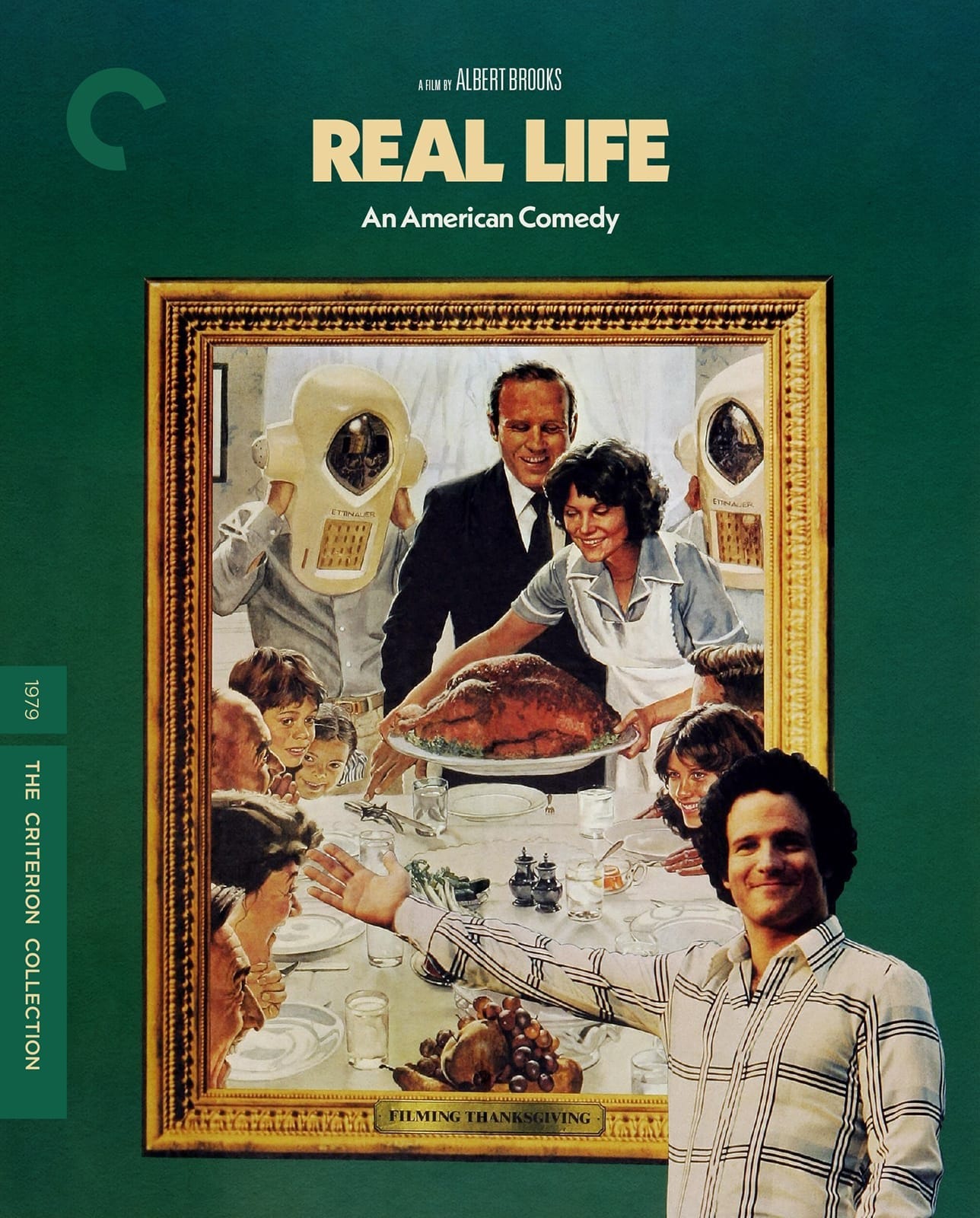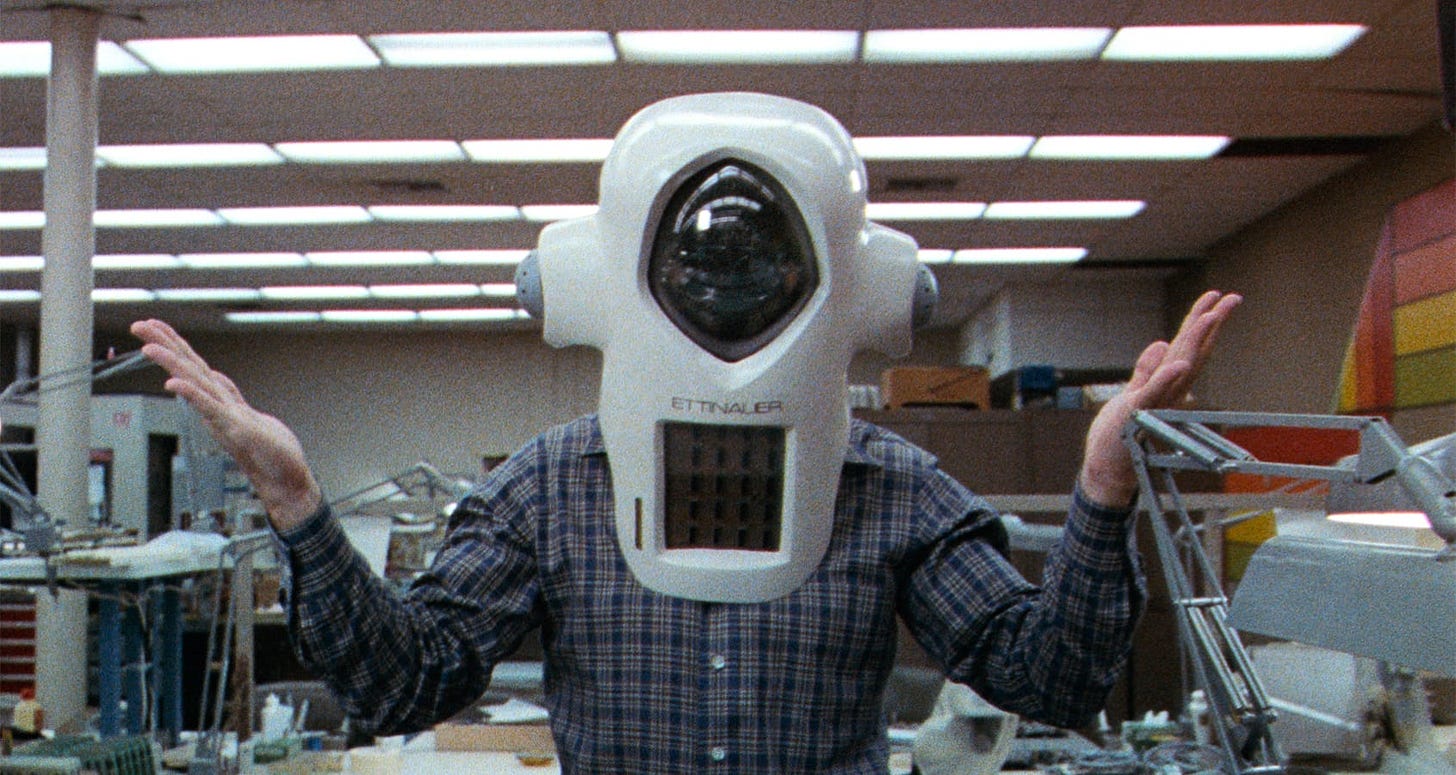The unexpected relevancy of Real Life (1979)
How Albert Brooks' directorial debut was more right about modern entertainment than I could've anticipated
Earlier this year, the 1979 film Real Life was announced to be coming to the Criterion Collection. I had never heard of this film prior to the announcement, despite hearing of other films by director Albert Brooks such as 1991’s Defending Your Life and 1985’s Lost in America and of course seeing him playing roles in films like Taxi Driver and Drive and hearing his voice acting in Finding Nemo. What first intrigued me about the film was the cover Criterion released for the film. The painted photo of the family at Thanksgiving surrounded by people wearing odd helmets (which in the film we learn are cameras designed to shoot footage in a similar way to how the human eye sees everything) stuck out to me. The synopsis on Criterion’s site and on Letterboxd both piqued my interest, particularly reminding me of Nathan Fielder’s The Rehearsal, one of my favorite shows of the past year. So I was interested and I kept the film in the back of my mind, though I never found the moment for me to finally sit down and watch it.
Then this week came. Thursday afternoon after finishing work, I took a trip to my nearest Barnes and Noble for the Criterion Collection sale. I didn’t quite know what I wanted to pick up going in except that if the All of Us Strangers 4K was there I would pick it up (sadly it was taken before I could get to it) and everything else I would just decide on a whim. I ended up seeing this on the shelf and something about it was calling to me. Something about it stood out and my eyes kept finding their way back to it. I was a little bit hesitant at first, seeing as I had not seen it. I’ve noticed a lot of people who are really into collecting blu-rays and DVDs, especially from boutique labels like Criterion or Arrow or Vinegar Syndrome, will do a lot of blind buys, films they’ve not yet seen but are interested in for one reason or another. I’ve been collecting blu-rays since I was 14 and I had never blindly purchased a movie I hadn’t seen because I was always afraid I would watch it and not like it. That is until this summer when I rolled the dice on the 4K of Farewell My Concubine, which I watched and eventually loved. I also bought As Tears Go By as part of the World of Wong Kar-wai box set during the flash sale and it was (and remains) the only film in that box set that I have not seen. So this now makes for the third film I blind bought ever. I purchased Real Life along with Eraserhead and Y Tu Mama Tambien and brought them home. And finally this morning I popped Real Life into my 4K player and watched the 98 minutes that would inspire this post.
Real Life follows an ambitious and narcissistic filmmaker named… Albert Brooks who decides to make a film about “reality”; in order for him to do this, he does a search for the perfect family in America by doing tests in collaboration with a sociological research organization on these various families to figure out which is the most interesting to follow on film. The winners of this experiment are the Yeager family from Phoenix, Arizona, and so Brooks and crew set out for Phoenix to follow the Yeagers and capture their life on film for an entire year. Almost immediately in the first scene you get a sense of just how ridiculous this person is. As he introduces himself and the project at a community event, he makes it seem more like a standup comedy bit, introducing other members of the project as if it’s a roast. He then ends the intro event by performing a song and dance number in front of the attendees from the area. It shows you right away that this guy is not exactly capable of helming a project like this, one that requires a lot of discipline when following this family around for an extended period of time and needing to get into various situations and dealing with the reaction from the community. His demeanor and attitude are diametrically opposed to what is needed in order to handle this kind of project, especially one that is, at least in theory, supposed to be tied to science. It also does an excellent job setting up the tone of the film, where Brooks is constantly acting like an arrogant, silly jackass throughout production while everyone else around him is looking at him like the idiot that he is.
Ultimately, though, that’s not my takeaway from the film. Rather, as indicated by the title, my takeaway from the film was how it predicted quite eerily closely what much of the modern media landscape looks like. The film is itself a spoof on a 1973 docuseries called An American Family, which filmed the lives of the Loud family of Santa Barbara, California, over the course of a year. The series, which lasted for twelve episodes, is largely considered the first reality television program in American history and ranks at #32 on TV Guide’s 50 Greatest TV Shows of All Time list. 50 years later, reality television makes up a large pocket of the television industry. Reality television has existed in some form since the 1940s, but it really took off in America as a trend in 1992 with MTV’s The Real World, and from there it spread like wildfire. Now we see shows like Survivor, Big Brother, The Bachelor and others which are, supposedly, unscripted and meant to capture “reality”, as Brooks puts it in the film. The examples of reality television I mentioned above are different from the type that Real Life is spoofing, in that shows like The Bachelor or Survivor are competition reality shows while shows like An American Family or Duck Dynasty are ostensibly supposed to more closely resemble a cinéma vérité style of filmmaking. There’s also the flavor of reality television that’s more comedy-oriented, shows like Impractical Jokers or Nathan For You where they depict their hosts interacting with people in intentionally embarrassing situations for the sake of humor. And in a sense one could argue the news functions a lot like reality television in how many events are sensationalized for clicks and views, and by further extent profit. I don’t think this film is necessarily going that deep, but it’s not an unreasonable extent to take it to. But it ended up being, however accidentally, prolific in how it predicted the sensationalism of reality television and the extreme to which that sensationalism goes.
The reality television connection is quite an obvious one, one that can be made by anyone who watches even the first 30 minutes. It’s in the first sentence of Criterion’s blurb for the film even, and just about any film scholar or essayist will bring it up. But if I can take it a step further, this also really reminded me of a lot of Internet content, specifically vlogging. I remember being 16 when Jake and Logan Paul were starting to become really popular. They’re probably the best examples of sensationalized content vis a vis the Internet with doing some of the stupidest shit they could think of in their videos (the first one that comes to mind is the infamous suicide forest video). Of course, sensationalism isn’t required for vlogs or reality television inherently. There’s plenty of vloggers and family vloggers that are simply that, people who document their lives and daily activities on camera and put them into YouTube videos or TikToks or Instagram reels or what have you. To compare this to reality television isn’t really accurate as it generally comes off as more “real” than most reality TV, which ironically feels largely staged and many reality TV shows are at least partly staged. That’s not to say there are no Internet vlogs that’ve been staged, but for a lot of these people there’s no incentive for the people making these vlogs to straight up lie on camera. And the film within Real Life is supposed to be like this as well. Nothing in the film is specifically staged. In fact when much of the crew that’s supposed to be on the project, they’re immediately dismissed in favor of cameramen with over-the-head Ettinauer 226XL cameras following the family everywhere. The film is ostensibly supposed to be reality on camera, almost similar to something like Boyhood, and Internet vlogs are closer to capturing that than shows like Keeping Up With the Kardashians or Here Comes Honey Boo Boo ever could be.
I’ll admit I don’t have a super deep analysis of this film and how you can tie it to today’s Internet content or reality television, perhaps because the connection itself isn’t necessarily that deep. But it kind of took me aback how much this film was able to get right, again however accidentally, about what was to come in the 45 years since its release. Even for its time it’s a deeply funny satire of ego and entertainment and today it hits even harder when you see the content that has come out of the modern era and the existence of the Internet and social media. I’m almost surprised there hasn’t been someone trying to step up and do a remake of this, not necessarily because there’s something you could add to the story based on the observations one might make but rather because the idea of a story like this set in the modern day might seem enticing to studios to capitalize on the trend of vlogging. Maybe it’ll happen eventually, but honestly this film is already hitting enough as is and we should let the film and its prediction stand the tests of time on its own with no remake to make it more “modern”. I really really loved the film and I have suggested to others already that they should check it out. I will do the same here. Absolutely give this a watch, you won’t regret it.





